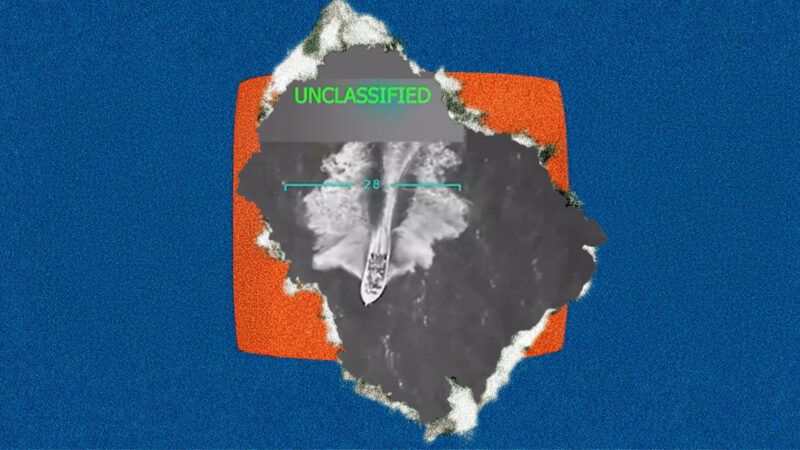Trump Orders Strike on Suspected Venezuelan Gang Boat in Caribbean
The attack follows the largest U.S. military buildup in Latin America since 1989, as Washington escalates its campaign against cartels tied to Nicolás Maduro’s regime.

On Tuesday, President Donald Trump carried out a strike on a boat in the southern Caribbean that he claims was operated by members of the Tren de Aragua gang and en route to the United States with drugs on board. "The strike occurred while the terrorists were at sea in International waters transporting illegal narcotics, heading to the United States," Trump posted on Truth Social with a video of the strike. "Please let this serve as notice to anybody even thinking about bringing drugs into the United States of America. BEWARE!"
The strike followed last week's deployment of eight U.S. warships, one nuclear-powered submarine, and thousands of Marines—the largest military buildup in Latin America since the 1989 invasion of Panama. Officially, Washington says it's fighting drug cartels by first designating them as global terrorists. Yet Trump "secretly signed a directive to the Pentagon" instructing the military to start targeting cartels. But the Venezuelan regime is no ordinary cartel.
In early August, Secretary of State Marco Rubio announced a reward of up to $50 million "for information leading to the arrest and/or conviction" of Venezuelan President Nicolás Maduro "for violating U.S. narcotics laws." Maduro is accused of being "a leader of Cartel de los Soles" (Cartel of the Suns), a powerful trafficking network that, like Tren de Aragua, has become a target of U.S. operations.
In 2024, Edmundo González Urrutia won Venezuela's presidential election with 67 percent of the vote, but Maduro's dictatorship refused to relinquish power and forced him into exile. Despite clinging to illegitimacy, Maduro denounced the U.S. deployment at the United Nations as "a serious threat to regional peace and security." At home, he attempted to project strength by launching a nationwide enlistment drive in mid-August, opening militia registration centers across the country, but the campaign seems to have been a failure.
The U.S., meanwhile, is building a coalition in Latin America to attack the Cartel of the Suns, getting other countries to also declare it a terrorist organization. So far, Ecuador, Paraguay, Argentina, and the Dominican Republic have joined the initiative. France has also reinforced its military presence in the Caribbean. A report detailing Operation Imeri, a plan Brazil had devised for a rescue operation of Maduro following the recent U.S. deployment, was ultimately rejected by sectors of the Brazilian Navy. However, despite the reports coming from reputable sources, its existence was later denied by Brazil's Defense Ministry.
But now, everything depends on how far Trump is willing to go. This is the first direct action that the administration has taken against an organization related to the regime in Caracas. Trump directly named Maduro as the mind behind the organization, and accused him of overseeing "mass murder, drug trafficking, sex trafficking, and acts of violence and terror across the United States and Western Hemisphere." During his briefing, the president also hinted at future actions against the regime, saying, "There's more where that came from."
The equipment deployed is not suitable for simply carrying out an anti-drug operation. It includes boats such as the USS Jason Dunham, which can use Tomahawk cruise missiles to hit targets accurately from over 1,000 miles. The forces are also not enough to start an occupation, and an intervention risks entangling the U.S. in another costly foreign conflict. But it is possible that we will see more strikes on vessels, and potentially, strikes on Venezuelan soil against drug operations. Venezuela is one of the key transit countries for cocaine, with nearly 24 percent of all the cocaine in the world going through the country, with the protection of the Cartel of the Suns.
The White House has promised repeatedly to bring to justice those responsible for smuggling drugs into the country. The U.S. is capable of conducting such an operation on Venezuelan soil, as we saw a few months ago when asylum-seeking opposition leaders were rescued from the Embassy of Argentina in Caracas—considered the most guarded place in the country after the government palace—by U.S. and Italian government forces.
If Trump were to deploy such a military force and then pull back, it would be a political defeat for him and an easy victory for the dictatorship. He has political reasons to conduct a high-level operation, one of which is the mid-term elections. The president will need the support of the Hispanic community, the largest minority in the country, and their support for Trump has diminished following his punishing deportation campaign—support he could largely regain if he captured Maduro. Another reason is that Trump might be holding a meeting with the Chinese President Xi Jinping in October, and holding this meeting after suffering a political defeat to the Maduro regime would put the U.S. in a weak position. However, if Trump gets to the meeting with a political victory over one of China's allies, it could give him the upper hand.
What is now clear is that this is not a mere show of force. Washington seems to be testing the limits of intervention. How this gamble plays out remains uncertain. For many Venezuelans, the possibility of outside pressure offers a fragile sense of hope after decades of repression, yet the risks of escalation and regional instability are just as real. However this plays out, the outcome will reverberate far beyond Caracas, shaping both Venezuela's future and the United States' role in the hemisphere.


Show Comments (80)